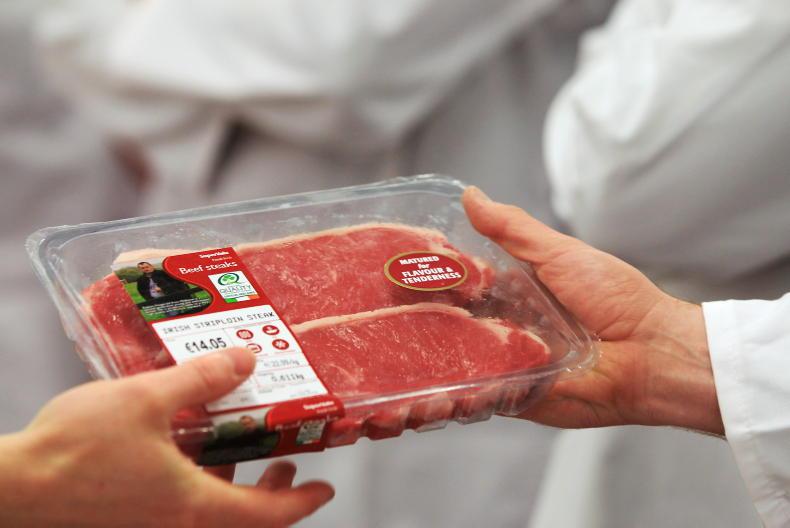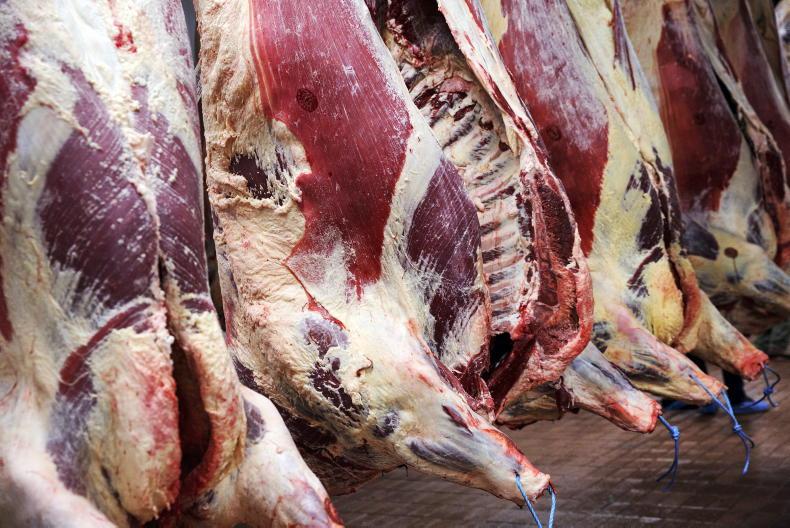As EU/UK negotiations on a future trade agreement following Brexit go down to the wire, farmers are in for a very uncertain Christmas in relation to beef prices.
The news on Sunday that negotiations are set to continue into next week has done little to calm markets.
Reports that UK supermarkets are now mobilising their suppliers to stockpile food are widespread.
Long tailbacks of trucks in Kent have been blamed on increased movement of goods into Britain.
No sector is more exposed to the tariffs that willresult from negotiations collapsing without a deal than the fresh meat sector and, in particular, beef – which carries one of the highest tariffs at over 70%.
There is huge potential for the threat of tariffs on 1 January to drive cattle prices up dramatically
Financial incentive
While the looming threat of tariffs will create a huge problem on 1 January, it also creates a major financial incentive in the days ahead for Irish factories to get as much beef into Britain as they can.
Depending on the individual cuts, beef from animals slaughtered from this week onwards could remain in chilled storage until late-January.
While trying not to spook the market, there is no doubt Irish beef factories are looking to ramp up production in the days ahead.

While quotes to farmers largely remain unchanged, larger finishers are starting to mobilse stocks on the back of securing a price 10-15c/kg above the base, or in the case of plainer type cattle, a minimum guaranteed price.
I know €3.65-€3.70c/kg has been offered as a minimum price for plainer dairy-bred steers over the weekend. A flat price of up to €4/kg has been paid for dairy-bred heifers.
Where the market goes in the weeks ahead remains unclear.
One point worth remembering though is that access to cold storage facilities in Britain could pose a problem and curtail demand from Irish factories.
Agreement
Meanwhile, a successful conclusion to the ongoing negotiations or a political commitment that the introduction of tariffs will be delayed or offset in the event of talks collapsing could quickly see markets normalise.
However, in the absence of this, and for as long as the uncertainty remains, there is the potential that the threat of tariffs from 1 January will drive cattle prices up dramatically in the coming days.
In the current environment it is key that farmers keep a close eye on market reports, which we will update daily on our website over the coming week.
Read more
Brexit: what if no deal really happens?
Tsunami of Irish beef heading to rest of EU in event of no-deal
As EU/UK negotiations on a future trade agreement following Brexit go down to the wire, farmers are in for a very uncertain Christmas in relation to beef prices.
The news on Sunday that negotiations are set to continue into next week has done little to calm markets.
Reports that UK supermarkets are now mobilising their suppliers to stockpile food are widespread.
Long tailbacks of trucks in Kent have been blamed on increased movement of goods into Britain.
No sector is more exposed to the tariffs that willresult from negotiations collapsing without a deal than the fresh meat sector and, in particular, beef – which carries one of the highest tariffs at over 70%.
There is huge potential for the threat of tariffs on 1 January to drive cattle prices up dramatically
Financial incentive
While the looming threat of tariffs will create a huge problem on 1 January, it also creates a major financial incentive in the days ahead for Irish factories to get as much beef into Britain as they can.
Depending on the individual cuts, beef from animals slaughtered from this week onwards could remain in chilled storage until late-January.
While trying not to spook the market, there is no doubt Irish beef factories are looking to ramp up production in the days ahead.

While quotes to farmers largely remain unchanged, larger finishers are starting to mobilse stocks on the back of securing a price 10-15c/kg above the base, or in the case of plainer type cattle, a minimum guaranteed price.
I know €3.65-€3.70c/kg has been offered as a minimum price for plainer dairy-bred steers over the weekend. A flat price of up to €4/kg has been paid for dairy-bred heifers.
Where the market goes in the weeks ahead remains unclear.
One point worth remembering though is that access to cold storage facilities in Britain could pose a problem and curtail demand from Irish factories.
Agreement
Meanwhile, a successful conclusion to the ongoing negotiations or a political commitment that the introduction of tariffs will be delayed or offset in the event of talks collapsing could quickly see markets normalise.
However, in the absence of this, and for as long as the uncertainty remains, there is the potential that the threat of tariffs from 1 January will drive cattle prices up dramatically in the coming days.
In the current environment it is key that farmers keep a close eye on market reports, which we will update daily on our website over the coming week.
Read more
Brexit: what if no deal really happens?
Tsunami of Irish beef heading to rest of EU in event of no-deal











SHARING OPTIONS